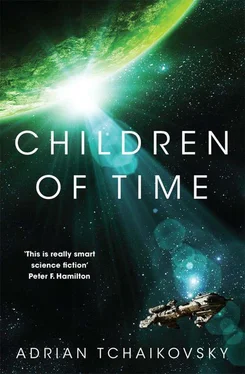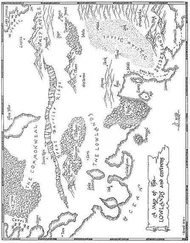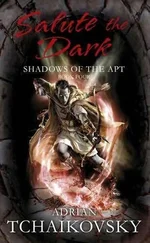She is bitterly exhausted when she crawls through the entrance of her peer house, located at the lowest point of the series of bubble chambers in which her fellows dwell and meet. Another couple of rooms have been added since she was last here – re-structuring is no major chore for her kind – and for a moment she feels proud and happy that her peers are doing well, before her treacherous memory goads her with the thought of the ants’ inexorable advance. Building more just means more to lose.
Those of her peers who are currently in residence greet her warmly. Several of her closer friends are holding court there at the centre of a worshipful knot of younger females and fluttering, dancing males. Their dances are courtship rituals that they constantly almost, but not quite, consummate. Other than menial labour, this is the place of a male in Portia’s society: adornment, decoration, simply to add value to the lives of females. The larger, more notable or more important a female is, the more males will dance attendance on her. Hence, having a crowd of uselessly elegant males around one is a status symbol. If Portia – the great warrior – were to stay still long enough, then she would attract her own entourage of hopeful parasites; indeed, if she cast them off and refused their attentions she would be diminishing herself in the eyes of her peers and her culture.
And sometimes the courtship will proceed as far as mating, if the female feels sufficiently safe and prosperous to start work on a clutch of eggs. The act of courtship is consummated as a public ritual, where the hopeful males – in their moment of prominence – perform in front of a peer group, or even the whole city, before the female chooses her partner and accepts his package of sperm. She may then kill and eat him, which is thought to be a great honour for the victim, although even Portia suspects that the males do not quite see it that way.
It is a mark of how far her species has come, that this is the only openly acceptable time when killing a male is considered appropriate. It is, however, quite true that packs of females – especially younger ones, perhaps newly formed peer groups seeking to strengthen their bonds – will descend to the lower reaches of the city and engage in hunting males. The practice is covertly overlooked – girls will be girls, after all – but overtly frowned upon. Killing a male, sanctioned or not, is a world apart from killing a beast. Even as the fang strikes, the killer and the slain know themselves to be part of a grander whole. The nanovirus speaks, each to each. Portia’s culture is strung between base spider nature and the new empathy the nanovirus has inflicted upon them.
There are more of her peers here than Portia had expected to see. One of her seniors is entering her time and therefore must retire from society for a month or so, and her sisters are rallying round her to make the ordeal as painless as possible. Portia ascends to one of the inner chambers to witness the rite, because it will at least give the illusion that life here is proceeding according to age-old patterns, and so might continue in the same way for generations to come. She arrives just in time to see her ailing sister retreat into her cocoon. In ancient, primitive times she would have been left alone in some high, safe spot, spinning her own retreat before retiring in lonely secrecy. Now she has sisters to create her haven for her, and then keep her company while she moults.
Portia’s kind must shed their skins in order to grow. When it is time for a large female to cast off her skin – when she feels it too tight at each joint and with each breath of her abdomen – she retires to her peer house, to the company of those she trusts, and they spin her a cocoon that will support her expanded frame until her expanded skin has hardened again.
As Portia watches, the retiring female begins the difficult, painful task of ridding herself of her skin, first flexing her abdomen until the shell cracks there, and then peeling herself from back to front. The process will take hours, and her sisters stroke the cocoon with messages of solidarity and support. They have all been through this.
It must be difficult for males, who presumably undergo the ordeal alone, but then males are smaller, and less sensitive, and Portia is honestly not sure how capable they are of finer levels of thought and feeling.
A handful of her sisters notice Portia there and scurry over to talk. They listen with agitation to her news of Seven Trees – news that will be all over Great Nest by now, because males can never keep their feet still when they have something to say. Her fellows touch palps and try to tell her that what happened to Seven Trees cannot happen here, but nothing they say can remove those images from Portia’s memory – the flames, the whole structure of a thriving settlement just withering in the heat; the reservoir fraying and splitting, its waters cascading down amid a rising curtain of steam; those who could not jump or glide far enough being overwhelmed by the roiling tide of ants, to be dismembered while still alive.
She performs a careful calculation based on her count of days and the elevation of the sun outside, and tells them that she is going to the temple. She badly needs peace of mind, and the Messenger will be passing soon.
Go quickly. There will be many others seeking the same , one of her sisters advises her. Even without Portia’s personal experience, the population of Great Nest is fast becoming aware that they face a threat seemingly without limit. All their centuries of culture and sophistication may become nothing but a fading memory in the minds of the stomatopod sea-dwellers.
The temple at Great Nest is the city’s highest point, a space without walls, strung between the extremity of the canopy above with an inward-sloping floor below. At its centre, on the apex of one of the city’s original trees, is the crystal that Portia’s own ancestress wrested from the ants, a deed that has since become legend. If Portia reaches inside herself, she can even touch that other Portia’s Understandings, a private retelling of the well-known story through the lens of first-hand experience.
She arrives ahead of the Messenger’s appearance, but there is already barely room for her amongst the crouching multitude, thronged all the way up to the central trunk. Many have the look of refugees – those who escaped Seven Trees and other places. They are come here to find hope because the material world outside seems to hold little of it.
How Portia’s people regard the Messenger and its message is hard to say: theirs is an alien mindset, trying to unravel the threads of a phenomenon they are equipped to analyse and yet not understand. They gaze up at the Messenger in its fleet passage across the sky, and they see an entity that speaks to them in mathematical riddles that are aesthetically appealing to a species that has inherited geometry as the cornerstone of its civilization. They do not conceive of it as some celestial spider-god that will reach down into their green world and save them from the ant tide. However, the message is . The Messenger is. These are facts, and those facts are the doorway to an invisible, intangible world of the unknown. The true meaning of the message is that there is more than spider eyes can see or spider feet can feel. That is where hope lies, for there may yet be salvation hidden within that more . It inspires them to keep looking.
The priestess has emerged to dance, her stylus hunting out the connection points on the crystal as, invisibly, the Messenger crosses the blue vault of the sky while broadcasting its constant message. Portia spins and knots, reciting the mantras of numbers to herself, watching the votary begin her elegant visual proofs, each step, and every sweep of her palps speaking of the beauty of universal order, the reassurance that there is a logic to the world, extending beyond the mere chaos of the physical.
Читать дальше












